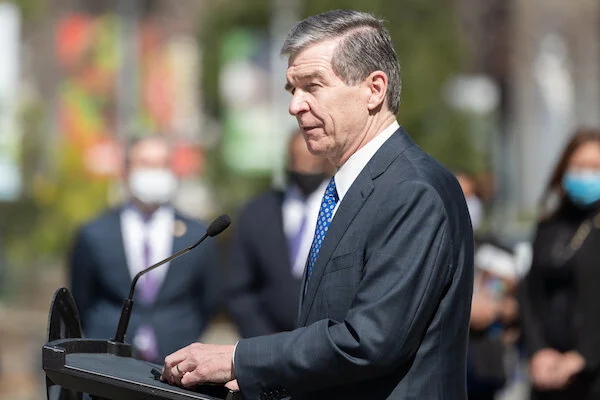Cooper vetoes pistol permit repeal, hotel safety measure
By Mitch Kokai, Carolina Journal
Gov. Roy Cooper has vetoed a high-profile bill that would have ended North Carolina's pistol permit requirement. The governor also nixed a hotel safety bill.
With his sixth and seventh vetoes of this legislative session, Cooper has now issued 60 vetoes since taking office in 2017. No other N.C. governor has vetoed more than 20 bills.
“Gun permit laws reduce gun homicides and suicides and reduce the availability of guns for criminal activity," Cooper said in vetoing House Bill 398, titled Pistol Purchase Permit Repeal. "At a time of rising gun violence, we cannot afford to repeal a system that works to save lives. The legislature should focus on combating gun violence instead of making it easier for guns to end up in the wrong hands.”
The governor made no mention of the pistol permit's dubious history. As Carolina Journal's Ray Nothstine has reported, the law's local permitting requirement dates to 1919. Supporters at the time relied on pistol permit requirements to prevent black North Carolinians from getting legal access to guns. A Reason magazine article has called the pistol permit "the Klan's favorite law."
"Except for North Carolina, every other Southern state has repealed its pistol permit laws," Nothstine reported.
A response to Cooper's veto from Sen. Chuck Edwards, R-Henderson, focused on the pistol permit law's history.
"Pistol purchase permits were created by Jim Crow Democrats to keep guns away from black people, and data shows that black applicants are still rejected at a higher rate than white applicants," Edwards said.
"In any other context, Democrats would view these facts and allege ‘systemic racism,’" Edwards added. "That they refuse to do so on this issue is yet more evidence that they selectively wield such accusations for political ends."
Lawmakers approved H.B. 398 on mostly party-line votes. Just two Democrats joined state House Republicans to approve the measure, 69-48. No Democrats supported the bill in the Senate, which approved it, 27-20. If all members are present and voting, the House would need 72 votes to override a gubernatorial veto. The Senate would need 30 votes.
The other vetoed legislation, House Bill 352, addressed hotel safety issues. It was designed to clarify that people renting rooms in hotels, motels, or similar lodgings are not "tenants" with rights spelled out in state law when dealing with apartment "landlords."
"This legislation is not the right way to ensure safety in hotels," Cooper said in his veto message. "It removes legal protections and allows unnecessary harm to vulnerable people, including families with children, who have turned to hotels and motels for housing in a time of need."
H.B. 352 attracted much more bipartisan support in the state House, with 12 Democrats joining Republicans to pass the measure, 81-37. One Democrat voted with Republicans in the Senate, which approved the bill, 28-20.
State legislators have not voted successfully to override a Cooper veto since December 2018. Cooper has issued 32 vetoes since 2019, after Republicans lost veto-proof supermajority control of the state House and Senate in the 2018 elections. So far, Republican lawmakers have not secured enough Democratic support to set aside any vetoes from the past three years.



